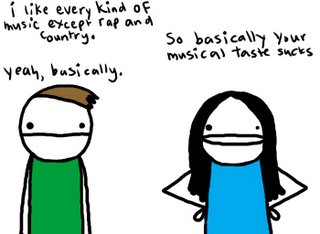Finally.
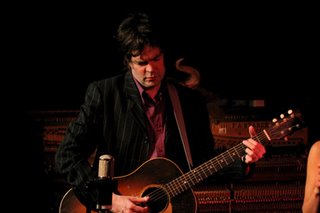
Unpopular pop fans, your prayers have been answered:
fairfax avenue: a jon brion resource.
Now go and revel in its goodness.

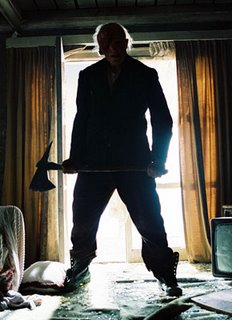 Who knew that writing about psychotic mutant hillbillies would be such a problem? I've been meaning to write about Alexandre Aja's remake of Wes Craven's The Hills Have Eyes for months now. With Halloween upon us, I figure it's now or never.
Who knew that writing about psychotic mutant hillbillies would be such a problem? I've been meaning to write about Alexandre Aja's remake of Wes Craven's The Hills Have Eyes for months now. With Halloween upon us, I figure it's now or never. There's something theraputic about compiling a list/manifesto of lurve via e-mail. That's what I found myself doing the past couple of days with Nayiri, friend and co-editrix of Horny Gandhi. Ostensibly this is a list of things we mutually love; for the most part it really is. I will confess that I had to google a couple of her selections, and I really can't say that I love (or am even familiar with) some of her selections that deal with makeup, purses, and fashion-designers. But I trust her, she has impeccable taste. Anyway.
Yes, Marie Antoinette again.
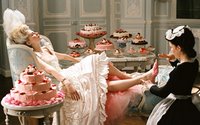 The first occurrence is during the opening shot. Kiki is lounging on a couch, amid a collection of pastries, being attended to by a maid; as the Gang of Four's "Natural's Not It" climaxes, she turns her head and seductively looks directly into the camera. The camera/we hold her gaze for a moment and then scene cuts to black. It's simultaneously sexy/funny, a "come hither" and a "fuck you," and it's an undeniably great moment. (Alas, it's one of the few.)
The first occurrence is during the opening shot. Kiki is lounging on a couch, amid a collection of pastries, being attended to by a maid; as the Gang of Four's "Natural's Not It" climaxes, she turns her head and seductively looks directly into the camera. The camera/we hold her gaze for a moment and then scene cuts to black. It's simultaneously sexy/funny, a "come hither" and a "fuck you," and it's an undeniably great moment. (Alas, it's one of the few.)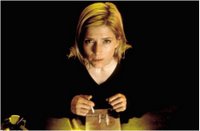 Obviously, Sofia isn't the first to break this protocol. The final shot of Paul Thomas Anderson's Magnolia has my favorite use of direct contact. After three hours of misery and heartbreak, the clouds are lifting; Claudia (Melora Walters) sits on a bed, listening to a lecture from Jim (John C. Reilly). Anderson pushes Reilly's speech way low in the mix; instead we're entirely focused on Walters' reaction and the song playing on the soundtrack, Aimee Mann's "Save Me." As the song reaches a crescendo, Walters raises her eyes, looks directly into the camera, and smiles. It's the first time in the film's entire running time that this major character actually smiles. (And if you've seen the film, you know that she's been through a lot and it really means something.) The camera holds on that smile for a beat before cutting to the credits. In a film full of great moments, Melora's eye contact/smile is a capper.
Obviously, Sofia isn't the first to break this protocol. The final shot of Paul Thomas Anderson's Magnolia has my favorite use of direct contact. After three hours of misery and heartbreak, the clouds are lifting; Claudia (Melora Walters) sits on a bed, listening to a lecture from Jim (John C. Reilly). Anderson pushes Reilly's speech way low in the mix; instead we're entirely focused on Walters' reaction and the song playing on the soundtrack, Aimee Mann's "Save Me." As the song reaches a crescendo, Walters raises her eyes, looks directly into the camera, and smiles. It's the first time in the film's entire running time that this major character actually smiles. (And if you've seen the film, you know that she's been through a lot and it really means something.) The camera holds on that smile for a beat before cutting to the credits. In a film full of great moments, Melora's eye contact/smile is a capper.A confession: I love nasty, below-the-belt political ads. And because some of my readers don't live in the California area, I fear that they will live their lives having never experienced the brilliance that is this anti-Jerry Brown ad.
When I walked out of an advance screening of Wes Anderson's The Life Aquatic with Steve Zissou two years ago, I remember thinking "So this is what all his detractors saw in his earlier films." Precocious and two-dimensional, Anderson made the (perfecto) art direction and (flawless) soundtrack do all the heavy-lifting and couldn't be bothered with little things like, you know, a well-formed script or compelling characters. That said, Zissou isn't without its moments--even though it's done nothing to really merit it, I still get choked up when I see that Jaguar Shark/"In twelve years, he'll be eleven and a half"/Sigur Ros scene--it's just a huge let down.
 Leaving Sofia Coppola's Marie Antoinette earlier this evening, I felt the same way. While The Virgin Suicides and Lost in Translation were impeccably-stylized and heartfelt shards of melancholy filmmaking, Marie Antoinette is... well, just what Coppola's critics have always maintained: a series of fashionable and pretty sequences, set to an excellent soundtrack, without an ounce of characterization or depth.
Leaving Sofia Coppola's Marie Antoinette earlier this evening, I felt the same way. While The Virgin Suicides and Lost in Translation were impeccably-stylized and heartfelt shards of melancholy filmmaking, Marie Antoinette is... well, just what Coppola's critics have always maintained: a series of fashionable and pretty sequences, set to an excellent soundtrack, without an ounce of characterization or depth. As my admiration for Armond White surely attests, I love me verbose contrarians. It will come as no surprise to you, then, that Ian Parker's recent New Yorker profile of Christopher Hitchens was like Christmas morning for me. How can you deny a man who talks about the transformative power of Proust in one sentence and then drops this:
Hitchens claims to be unperturbed by his critics. "You'd think I'd driven over their pets and abducted their daughters," Hitchens said. "I'd like to know what brings them on." A pause. "So I could do it more." He added, "People say, 'What's it like to be a minority of one, or a kick-bag for the internet?' It washes off me like jizz off a porn star's face."
